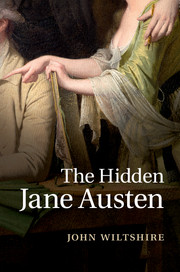Book contents
- Frontmatter
- Dedication
- Contents
- Preface
- Acknowledgements
- Introduction
- 1 Into the open with Catherine Morland
- 2 Elinor Dashwood and concealment
- 3 Elizabeth's memory and Mr Darcy's smile
- 4 The religion of Aunt Norris
- 5 The story of Fanny Price
- 6 Emma's overhearing
- 7 Anne Elliot and the ambient world
- Bibliography
- Notes
- Index
5 - The story of Fanny Price
Published online by Cambridge University Press: 05 June 2014
- Frontmatter
- Dedication
- Contents
- Preface
- Acknowledgements
- Introduction
- 1 Into the open with Catherine Morland
- 2 Elinor Dashwood and concealment
- 3 Elizabeth's memory and Mr Darcy's smile
- 4 The religion of Aunt Norris
- 5 The story of Fanny Price
- 6 Emma's overhearing
- 7 Anne Elliot and the ambient world
- Bibliography
- Notes
- Index
Summary
Fanny Price, the 10-year-old daughter of a marine on half-pay and one of a family of nine children living in the backstreets of the raucous naval city of Portsmouth, is adopted – more or less adopted – by the rich family of the Bertrams, who live at Mansfield Park, an extensive estate far away in the quiet English countryside of Northamptonshire. Today you can comfortably travel the distance in a few hours, but in the early nineteenth century it was an arduous two-day journey via London. After Fanny's adoption, communication between the two families almost ceases, and it is eight years before she returns to see her birth family. Fanny, who is small for her age, whose clothes are poor, whose education has been minimal, who lacks the airs and graces of her cousins, who is shy and nervous, is left to adjust to a new life in a family where everyone goes about their own business, and scarcely anyone has the slightest insight into her feelings. But like many adoptees and wards, she is expected to be grateful to those who have taken her in and to repay their benevolence. It is scarcely too much to say that she must adjust not only to a new family and a new house, but also to a distinctly different, even alien, culture. She is required to adopt the Bertrams' ways as her own and to forget, if she can, the years of her childhood. But assimilation, as she discovers, is not so easy.
Many novels about orphan children, some of them classics, were published in the eighteenth and early nineteenth centuries. Mansfield Park focuses not on an orphan, but on a ward or an adopted child, and is certainly the first to explore the impact, the psychological consequences, of a 10-year-old being wrenched from one environment to grow up in another. In the world today, especially in Western nations, where children are increasingly adopted from far-off places, the drama of Fanny's conveyance and transplantation has become newly arresting. In the twenty-first century, novels and memoirs about the traumas of adoption now abound. Nor is this the only contemporary genre in which displacement from one environment to another is a key issue. Narratives of emigration and displacement, stories of adaptation or estrangement within a new country and culture, now also form a substantial and increasing volume of writing in English. Much can be lost in the translation not merely from one language to another, but from one world to another, and piercing nostalgia for the homeland, as well as the necessity to succeed in, or at least adapt to, the new conditions, often forms the traumatic core of these narratives. It has been plausibly claimed, indeed, that we are all migrants now and that the project of ‘post-colonial’ studies is in part built on recognition of that fact. It might also be suggested that the travails of emigration and displacement are conditions of a modernity whose narrative history began in Jane Austen's time. The currency of such stories now enables us to read Mansfield Park as their precursor.
- Type
- Chapter
- Information
- The Hidden Jane Austen , pp. 92 - 122Publisher: Cambridge University PressPrint publication year: 2014



